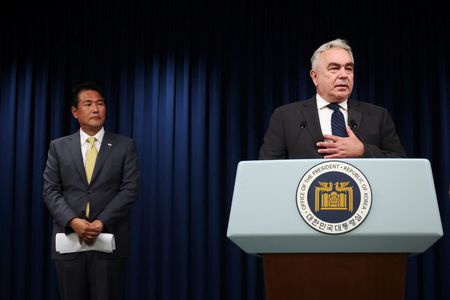By Michael Martina and David Brunnstrom
WASHINGTON (Reuters) – The State Department’s No. 2 diplomat suggested on Wednesday that the AUKUS submarine project between Australia, Britain and the U.S. could help deter any Chinese move against Taiwan.
The project, unveiled by the three countries in 2023, involves Australia acquiring nuclear-powered attack submarines as part of the allies’ efforts to push back against China’s growing power in the Indo-Pacific region.
But the three countries have been reluctant to publicly tie AUKUS to growing tensions over Taiwan, the democratically governed island claimed by China as its territory, with Australia saying it did not promise to support the U.S. in any Taiwan military conflict.
U.S. Deputy Secretary of State Kurt Campbell made a rare linkage between Taiwan and AUKUS, telling Washington’s Center for a New American Security think tank that new submarine capabilities would enhance peace and stability, including in the strait that separates China and Taiwan.
AUKUS’ submarine capabilities “have enormous implications in a variety of scenarios, including in cross-strait circumstances,” Campbell said.
“I would argue that working closely with other nations, not just diplomatically but in defense avenues, has the consequence of strengthening peace and stability more generally,” he added.
China has called the AUKUS pact dangerous and warned it could spur a regional arms race.
U.S. President Joe Biden has sought to step up partnerships with allies in Asia, including Japan and the Philippines, amid China’s historic military build-up and its growing territorial assertiveness.
Biden will host Japanese Prime Minister Fumio Kishida and Philippines President Ferdinand Marcos Jr for a summit in Washington on April 11, and meet Kishida for a bilateral summit the day before.
Campbell said the meetings will mark a “massive modernization” of the U.S.-Japan relationship and more engagement among the three countries including in the South China Sea, where Washington has criticized the Chinese coast guard’s use of water cannons on Philippine vessels near the disputed Second Thomas Shoal.
“There will be an unprecedented trilateral engagement … you will see commitments on all three nations that involve closer coordination and engagement in the South China Sea and elsewhere,” Campbell said.
That would include steps enabling the U.S. and Japan to jointly develop military equipment, he said.
The U.S. government has assessed that China helped Moscow “retool” and Russia “almost completely reconstituted militarily” after early setbacks in the Ukraine war, Campbell said.
(Reporting by David Brunnstrom and Michael Martina; Editing by Cynthia Osterman)











